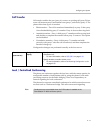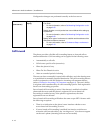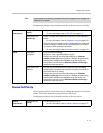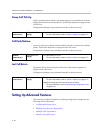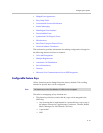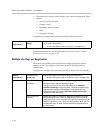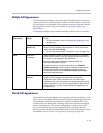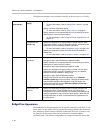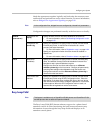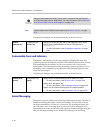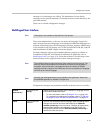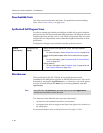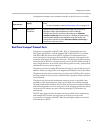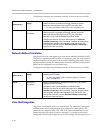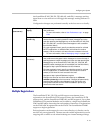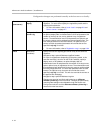
Configuring Your System
4 - 25
binds the appearances together logically and looks after the necessary state
notifications and performs an access control function. For more information,
refer to Bridged Line Appearance Signaling on page B-10.
Configuration changes can performed centrally at the boot server or locally:
Busy Lamp Field
The Busy Lamp Field (BLF) feature enhances support for a phone-based
attendant console. It allows monitoring the hook status and remote party
information of users through the busy lamp fields and displays on an
attendant console phone.
Note
In the configuration files, bridged lines are configured by “shared line” parameters.
Central
(boot server)
Configuration file:
sip.cfg
Specify whether diversion should be disabled on shared lines.
• For more information, refer to Call Handling Configuration <call/>
on page A-55.
Configuration file:
phone1.cfg
Specify per-registration line type (private or shared) and the shared
line third party name. A shared line will subscribe to a server
providing call state information.
• For more information, refer to Registration <reg/> on page A-84.
Specify per-registration whether diversion should be disabled on
shared lines.
• For more information, refer to Diversion <divert/> on page A-90.
Local Web Server
(if enabled)
Specify per-registration line type (private or shared) and third party
name, and whether diversion should be disabled on shared lines.
Navigate to http://<phoneIPAddress>/reg.htm
Changes are saved to local flash and backed up to <Ethernet
address>-phone.cfg on the boot server. Changes will permanently
override global settings unless deleted through the Reset Local
Config menu selection and the <Ethernet address>-phone.cfg is
removed from the boot server.
Local Phone User
Interface
Specify per-registration line type (private or shared) and the shared
line third party name using the SIP Configuration menu. Either the
Web Server or the boot server configuration files or the local phone
user interface should be used to configure registrations, not a mixture
of these options. When the SIP Configuration menu is used, it is
assumed that all registrations use the same server.
Note
This feature is available only on SoundPoint IP 600 phones and SoundPoint IP 601
and 650 phones with an attached Expansion Module.



